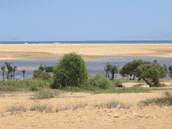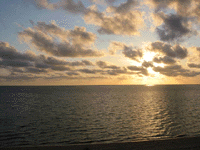 INTRODUCTION INTRODUCTION |
The third millenium will be that of Madagascar. This is indeed what its 15 million inhabitants are hoping for: a better life and prosperity. They are determined to take a new start and finish up with years of turmoil, slackness, demagogy, and corruption. Each one of the previous regimes with its new batch of rich and poor has turned the Big Island into one of the poorest nations in the planet.

A French colony for more than half a century, Madagascar gained its independence in 1960 like many other African countries. The Malagasy - the inhabitants of the island - took some time before they realized their independence was only a façade and before recognizing that their country remained under a strong political and economic influence. In May 1972, they demonstrated in the streets rejecting the French-Malagasy cooperation agreements. In May 18, 1972, considering the events, the first President of the Republic, Mr. Philibert Tsiranana, stepped down and gave his full powers to the Army's Chief of Staff, General Gabriel Ramanantsoa. May 1972 would remain the symbol of a new birth in the collective memory.
More than three years later, yielding to pressures and blackmail from all fronts, General Ramanantsoa passed in turn all powers to his Home Minister, Colonel Richard Ratsimandrava, murdered six days after taking office, on February 11 that same year. A military junta composed of eighteen members brought from the different army corps was created in less than two hours in order to fill up the vacuum left by the Head of State. Four months later, on June 15, 1975, this very institution would back Mr. Didier Ratsiraka's access to power through a secret vote of its members. Through a referendum, the new Constitution was approved and he was elected President of the Democratic Republic of Madagascar on December 31, 1975. This Navy officer set the country in the Socialist path and stayed in power for 16 years. Tired of both his policies and failures the population demonstrated again in the streets asking him to resign. The 1991events that brought Pr. Albert Zafy into power as Head of the Third Republic, forced him into exile in France. |
He got back into politics by defeating his successor and predecessor, Mr. Albert Zafy, in the second round of the 1996 presidential elections with a very narrow margin: 50.71% of the votes. He became the second President of the Third Republic. At the end of his term, many people thought he would retire. But, he would decide to run against President Albert Zafy, his former Vice Prime Minister Herizo Razafimahaleo, his former colleague under the Ramanantsoa administration, Civil Service and Labor Minister Daniel Rajakoba, the former President of the Union of Industries of Madagascar, Mr. Patrick Rajaonary and against the mayor of the capital, the businessman Marc RavalomananaMalagasy, who seem to have reached certain political maturity and who wanted to fight against the present political class voted massively. Never before polling stations had been opened so late (until midnight) in order to allow voters to designate the candidate they believed in.

The results of the December 16, 2001 elections are not yet final but the opposition has managed to get into difficulties the ecandidate Didier Ratsiraka. The opposition protests following the vote count were followed by demonstrations in the main cities of the country, and especially in the capital, asking for a new revision of the results. Mr. Marc Ravalomanana is convinced he won in the first round. The international community got together and addressed a strong message to the Malagasy political class inviting them to solve their differences in a calm and transparent way. A second round might be necessary in order to confirm the future president |

